Blockchain event ticketing: 7 Powerful Benefits in 2025
The Digital Revolution in Event Ticketing
Blockchain event ticketing is a technology that uses decentralized ledgers to create secure, traceable digital tickets as unique tokens that cannot be duplicated or forged. Here’s what you need to know:
- Definition: Digital tickets created as unique tokens on a blockchain with verifiable ownership history
- Key Benefits: Prevents fraud, controls resale prices, generates artist royalties on resales
- How It Works: Uses smart contracts to automate ticket transfers with predefined rules
- Primary Use Cases: Concerts, sports events, conferences, festivals, exclusive experiences
- Leading Features: Fraud prevention, secondary market control, royalty distribution, collectible value
The world of event ticketing has long been plagued by persistent problems: counterfeit tickets leaving fans stranded outside venues, scalpers reselling at exorbitant prices, and ticketing platforms suffering massive data breaches. In 2018 alone, the Ticketfly breach exposed approximately 27 million user accounts, highlighting the vulnerability of centralized systems.
Traditional ticketing relies on easily duplicated QR codes or barcodes, creating a perfect environment for fraud. Meanwhile, ticket prices have steadily increased—rising 4.2% year-over-year to an average of $46.69—partly due to unchecked secondary market activities where neither fans nor artists benefit.
This is where blockchain technology offers a transformative solution.
By creating tickets as unique digital tokens on a distributed ledger, blockchain ensures each ticket has only one valid owner at any time. Smart contracts—self-executing code—automatically enforce rules like resale price caps and creator royalties, addressing long-standing industry pain points in one neat technological solution.
“Over 80% of tickets for the 2019 UEFA Super Cup were distributed using blockchain technology, significantly reducing ticket fraud and scalping.”
I’m Samir ElKamouny AV, an entrepreneur with experience in digital change technologies including blockchain event ticketing systems that have revolutionized how fans experience live events. My work has focused on helping event organizers implement secure, transparent ticketing solutions that create new revenue streams while protecting both artists and attendees.
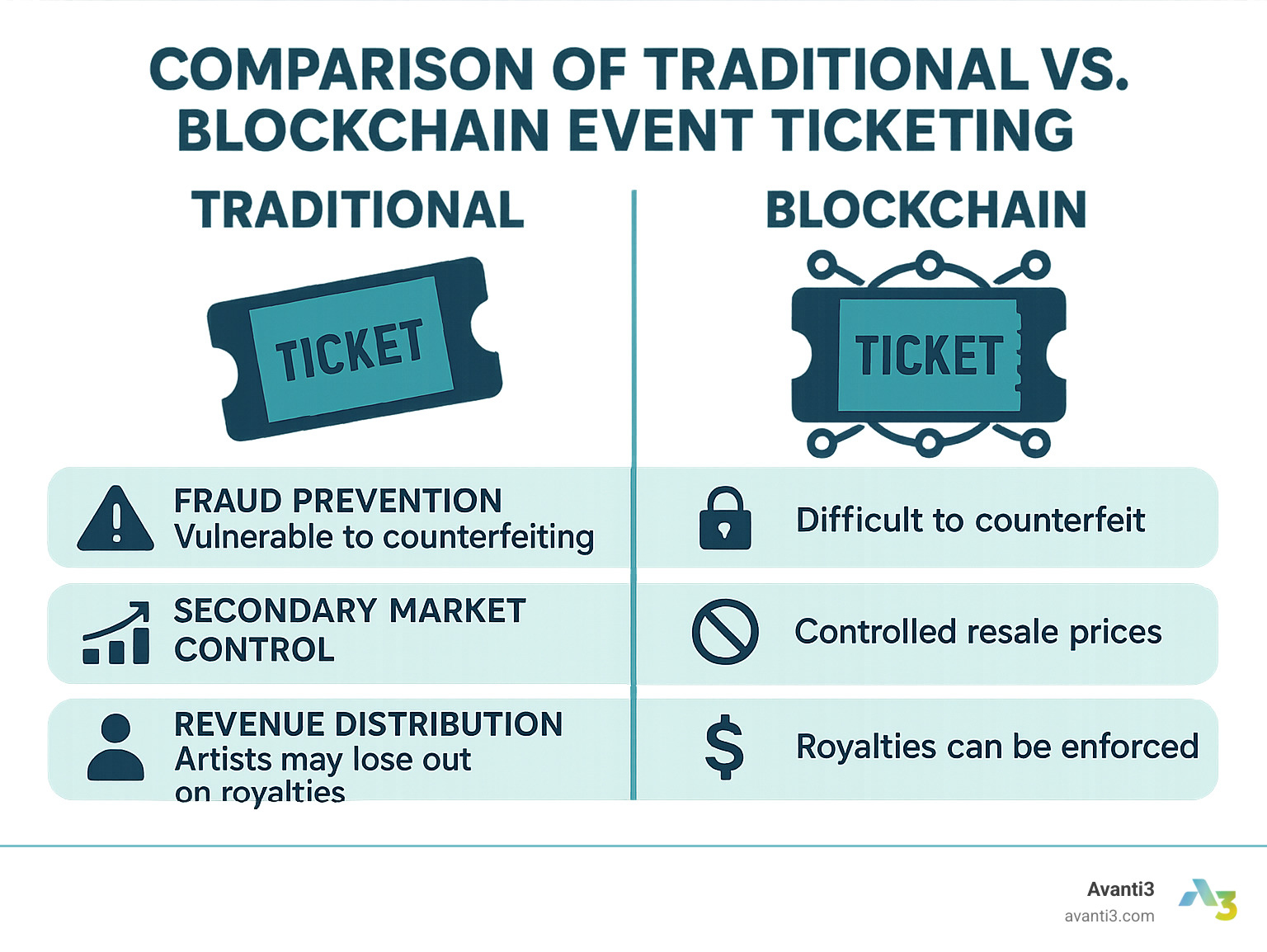
The Pain Points of Traditional Ticketing
The event ticketing industry has been stuck in the past for far too long. As someone who’s experienced these frustrations firsthand, I can tell you that the outdated systems create genuine headaches for fans, artists, and event organizers alike. Before we explore how blockchain transforms this landscape, let’s take an honest look at what’s broken in traditional ticketing.
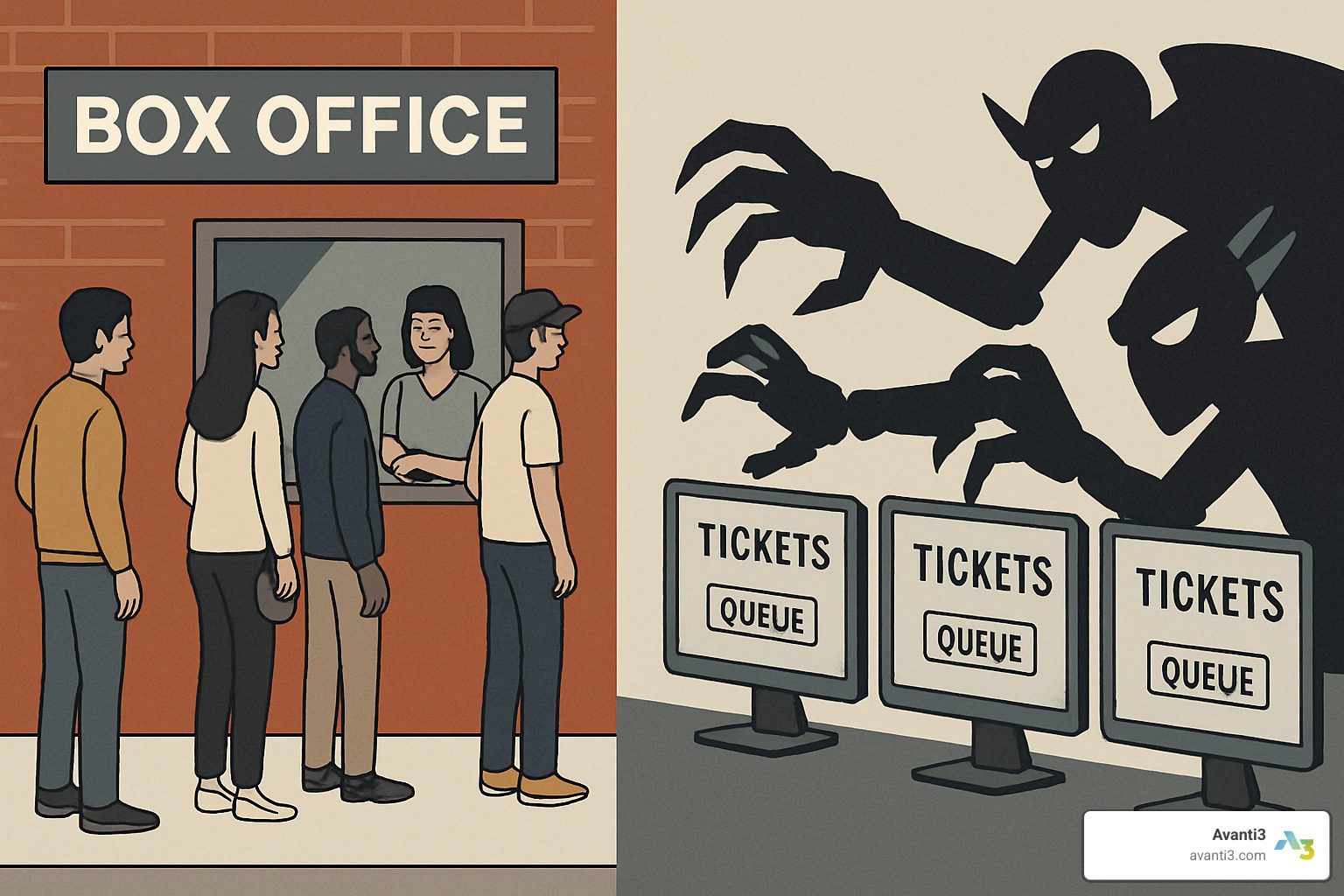
Fraud & Counterfeits
There’s nothing quite like the crushing disappointment of being turned away at a venue gate because your ticket—which you paid good money for—turns out to be fake. This heartbreaking scenario happens thousands of times at major events worldwide, leaving fans devastated and venues dealing with angry customers.
Traditional paper tickets are surprisingly easy to duplicate with today’s technology. Even digital tickets with standard QR codes can be copied and shared multiple times. Picture the chaos at entry points when multiple people show up with identical tickets for the same seat! Venue staff are left scrambling to determine who the legitimate ticket holder is, often with no clear way to resolve the situation.
Blockchain event ticketing eliminates this problem entirely by creating tickets that cannot be duplicated. The financial cost of ticket fraud runs into millions annually, but the emotional cost to fans who miss once-in-a-lifetime events is immeasurable.
Scalping & Price Gouging
We’ve all seen it happen: tickets for a highly anticipated show sell out in seconds (often snatched up by automated bots), only to reappear minutes later on resale sites at astronomical prices. This isn’t just annoying—it’s fundamentally unfair.
The average ticket price has climbed to $46.69, a 4.2% increase from the previous year, partly due to these unchecked secondary market activities. In extreme cases, tickets for popular shows have been resold with markups exceeding 1000%. What makes this particularly frustrating is that none of this additional money goes to the artists, venues, or organizers who created the value in the first place.
While some industry insiders might shrug off scalping as creating “heat” around a tour, most creators are strongly opposed to the practice—especially when it prices out their most loyal fans. After all, artists want their biggest supporters in the audience, not just those with the deepest pockets.
Security & Privacy Gaps
Remember the massive Ticketfly data breach in 2018? It affected approximately 27 million accounts, exposing names, addresses, phone numbers, and email addresses of ticket buyers. This wasn’t just a minor hiccup—it was a privacy disaster.
These security failures stem from traditional ticketing’s reliance on centralized databases—essentially putting all eggs in one vulnerable basket. When that basket breaks, everyone’s information is compromised. With Ticketmaster controlling roughly 80% of the event ticketing market, this concentration of sensitive customer data creates significant risks.
The lack of transparency in conventional systems means you often have no idea how your personal information is being used, stored, or potentially monetized by ticketing platforms. Your data might be traveling places you never agreed to, and you’d have no way of knowing.
Blockchain event ticketing addresses these pain points by decentralizing data storage and creating transparent systems where ticket ownership is clear, verifiable, and secure. By eliminating single points of failure, blockchain protects both your tickets and your personal information from exploitation.
The traditional ticketing model is clearly broken. Fans deserve better than counterfeit tickets, price gouging, and data breaches. The good news? There’s a solution on the horizon that’s already changing how we think about event tickets—and it’s built on blockchain technology.
How Blockchain Event Ticketing Works
Blockchain event ticketing is revolutionizing the way we think about attending live events. It’s not just a technological upgrade—it’s a complete reimagining of the relationship between fans, artists, and event organizers.
Blockchain Basics for Events
Think of blockchain as a digital ledger that everyone can see but nobody can tamper with. Unlike traditional ticketing systems where one company controls all the data, blockchain spreads this information across multiple computers around the world. This creates a system where ticket ownership is crystal clear and virtually impossible to fake.
When an event organizer issues tickets on a blockchain, each ticket becomes a unique digital asset with its own verifiable history. Every time that ticket changes hands, the transaction is permanently recorded—creating an unbroken chain of ownership from the moment it’s sold until you walk through the venue doors.
Event organizers typically choose between two types of blockchains:
Public blockchains like Ethereum or NEAR Protocol offer maximum transparency. Everyone can see every transaction, which builds trust but sometimes means higher fees and slower processing times.
Private blockchains give organizers more control and often cost less to operate, but sacrifice some of the trust-building benefits that come with full transparency.
The good news? According to research on blockchain scalability, newer solutions are addressing previous limitations, making blockchain increasingly practical for even the biggest events with thousands of ticket sales.
Smart Contracts 101
Smart contracts are like digital vending machines for tickets—they automatically execute actions when certain conditions are met, without needing a middleman.
These clever bits of code handle everything in a ticket’s life cycle:
Minting creates the ticket as a unique digital token.
Transfer moves ownership from seller to buyer instantly and securely.
Verification confirms the ticket is genuine when you arrive at the venue.
Burning invalidates the ticket after use, preventing anyone from trying to reuse it.
What makes smart contracts special is their ability to enforce rules that traditional systems simply can’t. They can automatically cap resale prices to prevent scalping, ensure artists receive royalties on secondary sales, implement time restrictions on transfers, or even process automatic refunds under specific circumstances.
The beauty of smart contracts is that these rules execute automatically—no exceptions, no human intervention needed. The code is the law, and it treats everyone equally.
What Makes Blockchain Event Ticketing Tamper-Proof
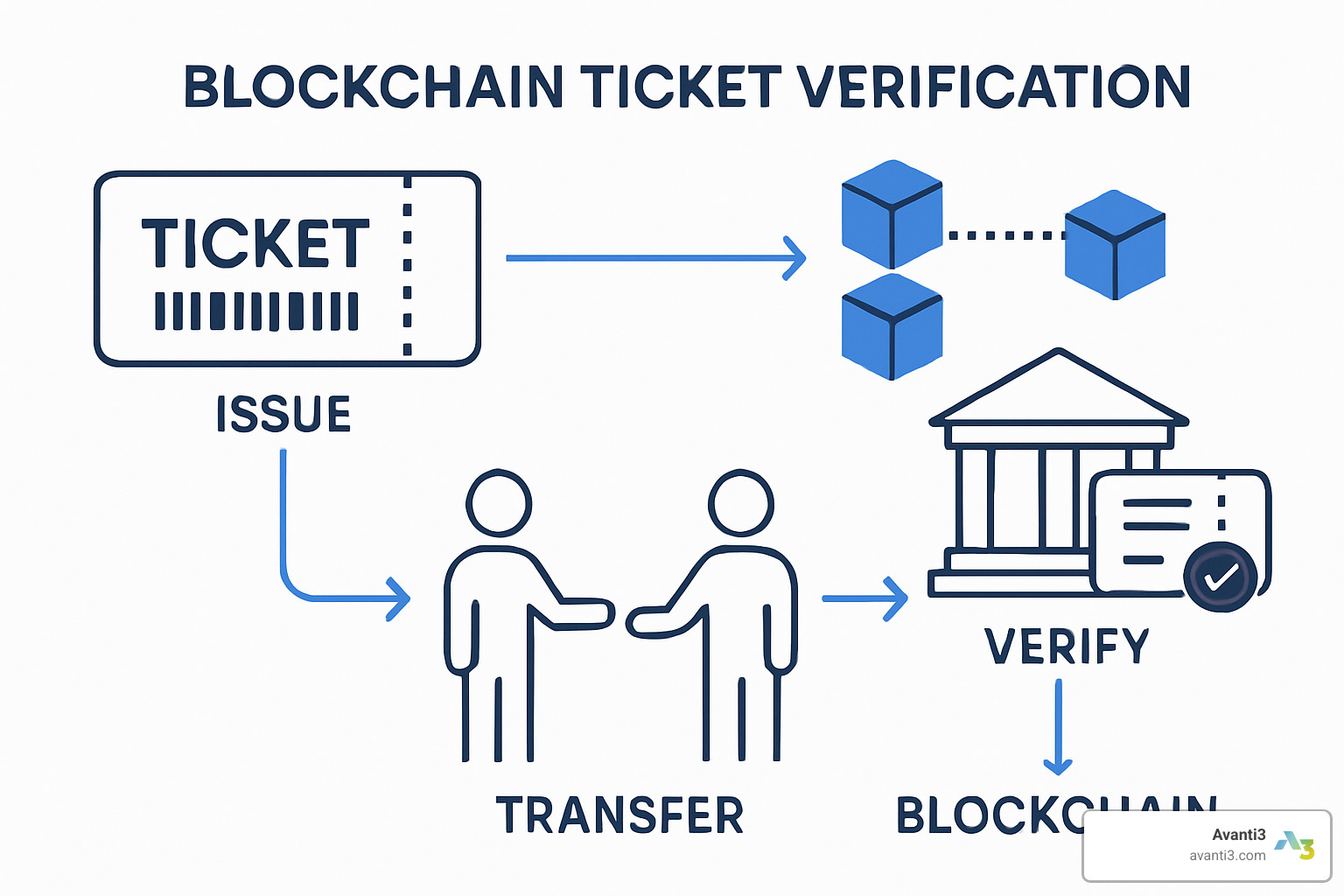
The magic of blockchain event ticketing comes from its bulletproof security features. It’s like having a ticket with its own unbreakable DNA.
First, there are cryptographic signatures. Every time a ticket changes hands, the transaction requires a unique digital signature that only the rightful owner can create. This makes unauthorized transfers virtually impossible.
Then there’s on-chain provenance—a fancy way of saying the complete history of your ticket is permanently recorded. From the moment it was created to when you use it at the venue, every transfer is visible and verifiable.
The system also uses distributed verification, where multiple independent computers must agree that a transaction is valid before it’s recorded. This eliminates single points of failure and makes manipulation nearly impossible.
Finally, once information is added to the blockchain, it becomes immutable—it cannot be altered or deleted. This creates a permanent, tamper-proof record of who owns what.
Together, these features create a system where ticket fraud becomes a thing of the past. Even if someone tried to create a fake ticket, it would lack the proper cryptographic signatures and verifiable history that venue staff can easily check.
Blockchain Event Ticketing vs Traditional Digital Tickets
While digital tickets were certainly better than paper stubs, blockchain event ticketing takes security and functionality to an entirely new level:
| Feature | Paper Tickets | Standard Digital Tickets | Blockchain/NFT Tickets |
|---|---|---|---|
| Duplication Risk | High (can be photocopied) | Medium (screenshots/forwarding) | Virtually None |
| Ownership Verification | Visual inspection only | Database lookup | Cryptographic proof |
| Transfer Tracking | None | Limited/centralized | Complete/transparent |
| Resale Price Control | None | Limited enforcement | Automated enforcement |
| Creator Royalties on Resale | None | Rarely implemented | Automatically enforced |
| Collectible Value | Physical memorabilia | None | Digital collectible/NFT |
| Data Security | N/A | Centralized vulnerability | Distributed security |
| Additional Content | Limited to physical space | Limited to QR code | Rich metadata and media |
What really sets blockchain tickets apart is their ability to contain rich metadata. Your ticket isn’t just access to an event—it can include exclusive digital content, backstage pass information, or even transform into a digital collectible after the event. Some fans are now keeping their blockchain tickets as digital mementos, much like how people used to save paper ticket stubs from meaningful events.
This marriage of security and improved functionality is why blockchain event ticketing isn’t just an incremental improvement—it’s a fundamental reimagining of what a ticket can be and do.
Stakeholder Benefits & New Revenue Streams
The shift to blockchain event ticketing isn’t just a tech upgrade—it’s a game-changer for everyone involved in live events. From fans to artists to organizers, this technology creates real benefits and opens doors to revenue streams that simply weren’t possible before.
At Avanti3, we’ve seen how our NFT Engagement Tools can transform the event experience from a one-time transaction into an ongoing relationship.
Fan Experience Upgrades
Remember the anxiety of forwarding a ticket to a friend and wondering if they actually received it? With blockchain tickets, those days are over. Transfers happen instantly with bulletproof security, giving everyone peace of mind.
But the magic really happens after the show ends. While traditional tickets become useless scraps, blockchain event ticketing turns them into digital collectibles that live on in your wallet. These digital mementos not only preserve your memories but can actually gain value over time—just like those vintage concert tickets from legendary shows.
“I was skeptical at first,” one concert-goer told us, “but when I received a surprise digital poster in my wallet the day after the show—signed by the artist—I was completely sold on the concept.”
These tickets can also open up exclusive content before, during, and after events. Imagine watching backstage footage that only ticket holders can access, or receiving surprise digital “airdrops” like artwork or even free tickets to upcoming shows. This transforms a simple admission pass into a key that opens multiple doors.
Organiser & Artist Advantages
For the folks putting on the show, blockchain event ticketing is like getting x-ray vision into their audience. Real-time analytics show exactly who holds tickets and how they’re changing hands, allowing for smarter marketing and planning.
Remember those frustrating ticket drops where everything sells out in seconds to scalper bots? Blockchain identity verification helps ensure actual humans—not automated programs—get first dibs on tickets. This builds tremendous goodwill with fans who appreciate the fair shot at seeing their favorite performers.
Perhaps most is how smart contracts handle money. Revenue can be automatically split among artists, venues, and promoters according to pre-agreed percentages—no more waiting months for payment or disputes over who gets what. And digital collectibles tied to tickets create entirely new merchandise categories with zero production costs. That’s money left on the table with traditional systems.
Traceability & Market Control
The most powerful aspect of blockchain event ticketing might be the control it returns to creators and organizers over the entire ticket lifecycle.
Smart contracts can enforce maximum resale prices—say, 120% of face value—preventing the outrageous markups we’ve all seen on secondary markets. Every time a ticket changes hands, a percentage automatically flows back to the original issuers. This means artists and venues finally benefit from resale activity instead of watching scalpers pocket all the profits.
All this secondary market activity is visible on the blockchain, giving unprecedented insights into real demand patterns. No more guessing games about pricing or venue size for future events—the data tells the story clearly.
The transparency of blockchain means everyone can see exactly what’s happening with tickets at all times. This visibility creates accountability that simply doesn’t exist in traditional ticketing, where much of the secondary market operates in shadows.
For fans, artists, and organizers alike, blockchain event ticketing represents what the ticket industry should have been all along: fair, transparent, and beneficial to the people who create and attend events—not just to middlemen.
Implementation Considerations & Best Practices
While the benefits of blockchain event ticketing are compelling, successful implementation requires careful planning and consideration of several key factors.
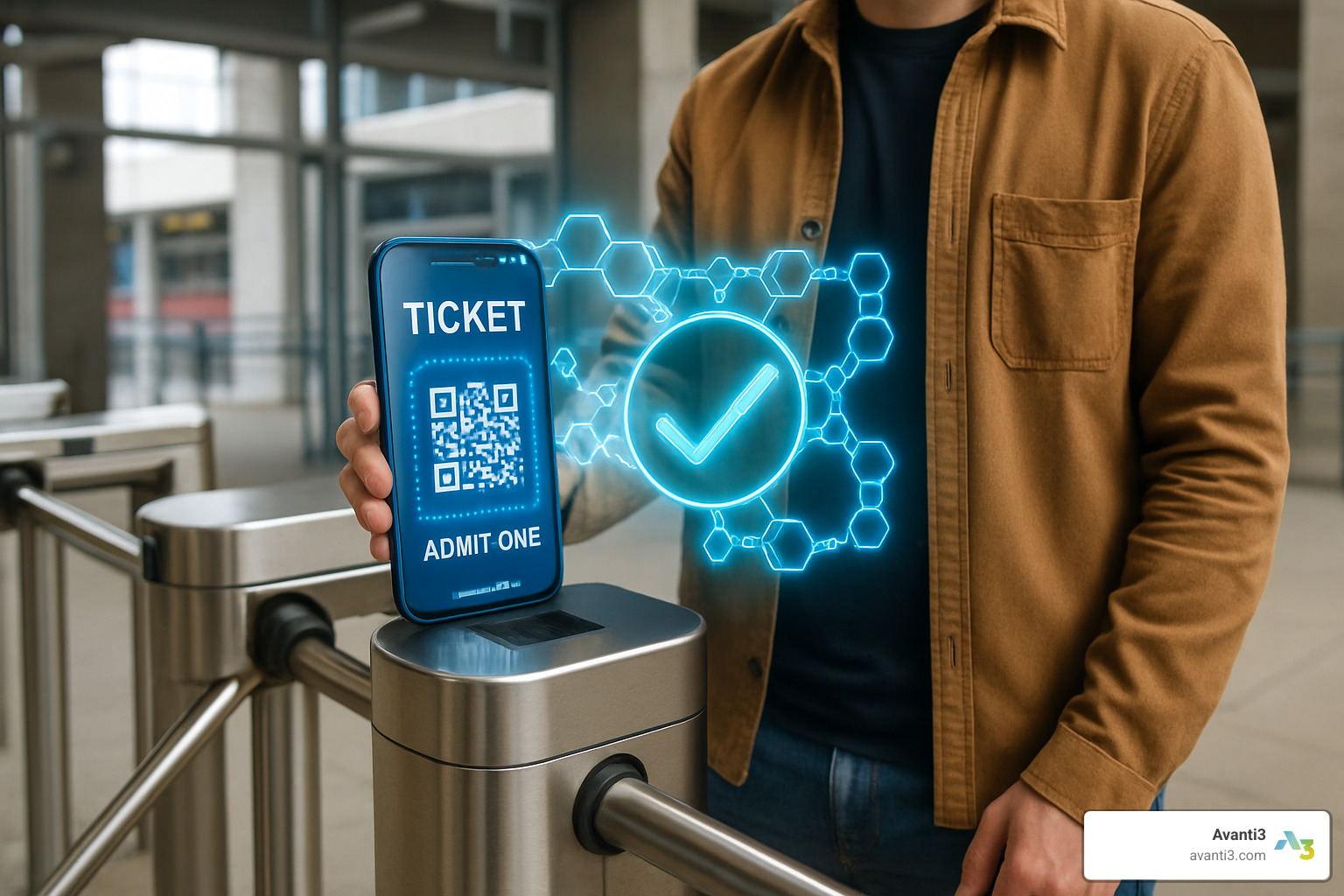
Cost, Speed & Scalability
Remember when we all worried blockchain would be too expensive and slow for real-world ticketing? Those days are thankfully behind us! Recent advancements have transformed what’s possible.
Gas optimization techniques have dramatically reduced transaction costs. NEAR Protocol, which several ticketing platforms now use, offers transactions often costing less than a penny each. That’s actually more cost-effective than many traditional ticketing solutions – a pleasant surprise for many event organizers I’ve worked with.
Sharding might sound like something from a fantasy novel, but it’s revolutionizing blockchain speed. By dividing the blockchain into smaller, manageable pieces that process transactions in parallel, we’re seeing dramatic throughput improvements. Think of it like adding more checkout lanes at a busy grocery store.
When exploring options for your event, you’ll encounter terms like “Layer 2 rollups” – these are solutions that process transactions off the main blockchain before bundling them together for final verification. This approach significantly cuts costs while boosting speed.
There are two main flavors worth understanding:
Optimistic rollups take an “innocent until proven guilty” approach – they assume transactions are valid unless challenged. These work well with existing systems and are relatively easy to implement.
ZK rollups (the “ZK” stands for Zero-Knowledge) provide cryptographic proofs that transactions are valid without revealing underlying data. This offers improved privacy and often faster finality – particularly important for high-profile events.
What’s truly impressive is the scalability we’re now achieving. Ethereum’s base capacity of 15-30 transactions per second can now scale to handle thousands or even millions through these Layer 2 solutions. That means blockchain event ticketing is now viable even for massive festivals and stadium shows.
Environmental & ESG Factors
Let’s address the elephant in the room – isn’t blockchain bad for the environment? Not anymore!
Many modern blockchains have moved away from energy-intensive proof-of-work systems. Carbon-neutral protocols like NEAR are officially certified as climate-neutral blockchains, eliminating environmental concerns that haunted earlier blockchain iterations.
What’s particularly neat is how blockchain itself can be used to transparently track carbon offset purchases. This allows event organizers to demonstrate their sustainability commitments with verifiable data rather than vague promises.
At Avanti3, we’re committed to environmentally responsible blockchain solutions that align with our clients’ ESG goals. When fans ask questions about environmental impact (and they increasingly do), you’ll have solid, positive answers backed by real data.
Integrations: IoT, AI & AR
The magic really happens when blockchain event ticketing joins forces with other cutting-edge technologies.
Imagine smart gates powered by IoT that automatically verify blockchain tickets as attendees approach. No more staffing bottlenecks or long lines – just a smooth, contactless entry experience that feels almost magical to attendees.
Behind the scenes, AI-powered predictive demand analysis can examine blockchain ticket transfer patterns to forecast demand for future events. This helps optimize pricing strategies and marketing efforts with unprecedented precision.
Perhaps most exciting for fans are the AR ticket collectibles that transform static digital tickets into interactive experiences. Our Augmented Reality NFTs allow fans to “activate” their ticket collectibles through their smartphone cameras, revealing 3D animations, exclusive content, or special offers that continue to provide value long after the event ends.
I’ve seen fans’ faces light up when they find their ticket has transformed into an interactive digital souvenir – it creates the kind of memorable moment that builds lasting brand loyalty.
Challenges & Risk Mitigation
Let’s be honest – implementing blockchain event ticketing isn’t without challenges. Success requires addressing several key areas:
Regulatory compliance varies widely across jurisdictions. Different regions have distinct approaches to digital assets and consumer protection. A thorough legal review should be part of any implementation plan to ensure you’re operating within the bounds of relevant laws.
Wallet user experience remains a hurdle for many consumers unfamiliar with digital wallets and private key management. The most successful implementations include user-friendly custodial wallet options with straightforward recovery mechanisms. Your average concert-goer isn’t a crypto enthusiast – they just want a seamless experience.
Offline validation capabilities are crucial because venues may experience network connectivity issues during events. Your solution should include contingency plans for smooth entry even when internet access is limited or unavailable.
Stakeholder education is perhaps the most overlooked aspect of successful implementation. Everyone from venue staff to ticket buyers needs appropriate guidance about the new system. Clear communication about benefits and processes makes all the difference between confusion and delight.
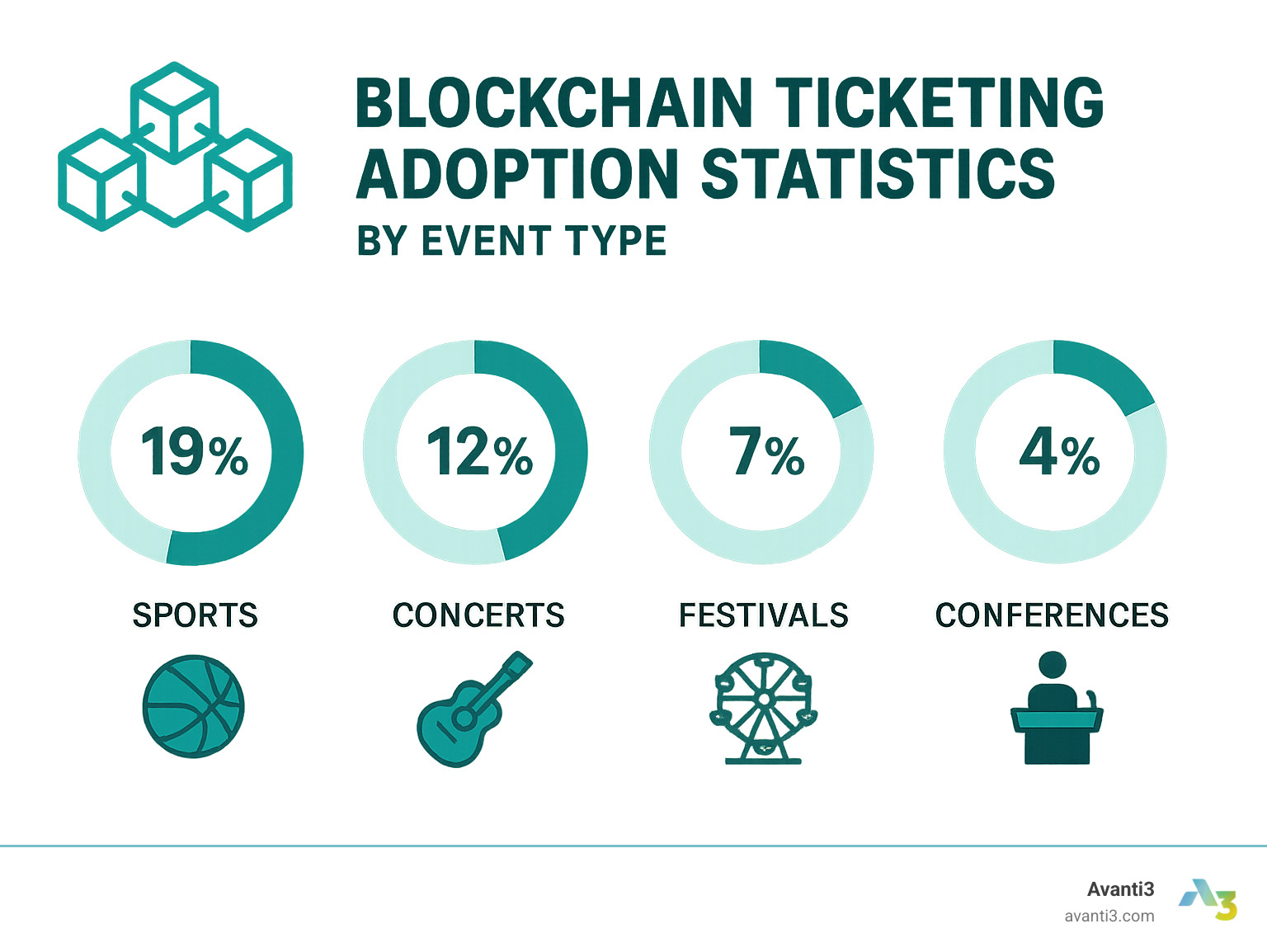
Frequently Asked Questions about Blockchain Event Ticketing
How does blockchain stop ticket fraud?
Ever been turned away at a venue because your ticket was somehow “already used”? It’s a heartbreaking moment that blockchain event ticketing eliminates entirely.
Think of blockchain tickets as having digital fingerprints that can’t be copied. Each ticket exists as a unique token on the blockchain with its own distinct identifier. Unlike traditional tickets where anyone with a printer or screenshot can create convincing fakes, blockchain tickets rely on sophisticated cryptographic signatures that can only come from the rightful owner’s digital wallet.
What makes this truly powerful is the permanent record of ownership. Every time a ticket changes hands—from initial purchase to any subsequent transfers—it’s recorded on an immutable ledger. This creates an unbroken chain of custody that venue staff can instantly verify when you arrive.
“The first time I used a blockchain ticket, I was amazed at how smooth the entry process was,” shares concert-goer Maria Chen. “The scanner turned green immediately, and I didn’t have that usual anxiety about whether my ticket would work.”
Can resale prices really be capped on-chain?
Yes! This is one of the most exciting aspects of blockchain event ticketing—it can actually solve the scalping problem that’s plagued the industry for decades.
Smart contracts (those self-executing agreements on the blockchain) can enforce maximum resale prices as an unbreakable rule. When artists or event organizers create tickets, they can program these price ceilings directly into the ticket’s code. If someone tries to sell above the allowed price (say, 120% of face value), the transaction simply won’t process.
The beauty of this system is its automation. No human needs to monitor or enforce these rules—they’re baked into the system itself. While determined scalpers might try to create off-chain arrangements to circumvent these controls, doing so requires significant extra steps and trust between strangers, creating natural friction against price gouging.
Some platforms have even implemented graduated price caps that allow for modest increases as the event date approaches (reflecting natural market dynamics) while still preventing the 500%+ markups we often see with traditional tickets.
What happens if a buyer loses their wallet access?
This is a valid concern and one we take seriously at Avanti3. After all, what good is a secure ticket if you can’t access it when needed?
Fortunately, several safety nets exist for blockchain ticket holders:
Custodial wallet options provide familiar account recovery methods similar to traditional online accounts, with password resets and recovery questions. For users new to blockchain, this offers peace of mind without sacrificing the benefits of the technology.
For the more security-conscious, multi-signature wallets require approval from multiple sources for recovery—perhaps combining something you know (password) with something you have (phone authentication).
Even in worst-case scenarios, customer support intervention with proper identity verification can help users recover access to their tickets. Many platforms maintain emergency recovery protocols specifically for high-value or time-sensitive assets like event tickets.
“We design our systems with real humans in mind,” explains a blockchain ticketing specialist. “The goal is security that protects you without becoming a burden.”
The key is finding the right balance between security and accessibility—something we’ve carefully crafted in our implementations at Avanti3. After all, technology should solve problems, not create new ones.
Conclusion
Blockchain event ticketing isn’t just another tech upgrade—it’s a complete reimagining of the relationship between events and the people who love them. By tackling those frustrating problems we’ve all experienced—fake tickets, outrageous resale prices, and that feeling that nobody’s looking out for the actual fans—blockchain creates a fairer world for everyone involved.
The beauty of this technology goes well beyond just keeping tickets secure. Artists finally get their fair share when tickets change hands. Fans get digital mementos that last long after the confetti has been swept away. And event organizers gain insights that help them create even better experiences next time around.
Here at Avanti3, we’re passionate about making these possibilities accessible to everyone. We’ve integrated blockchain event ticketing into our Web3 Platform Solutions in ways that feel intuitive and natural—no computer science degree required! Our goal is to make the transition so smooth that both organizations and their audiences barely notice the technology… they just enjoy the benefits.
The tide is turning in the events world. Early adopters who’ve acceptd blockchain event ticketing are already seeing remarkable results: dramatically reduced fraud, happier fans, and exciting new revenue streams that weren’t possible before.
As more venues and artists come on board, we’re seeing tickets evolve from simple “get in the door” passes to the beginning of meaningful relationships. That digital ticket in your wallet isn’t just proof you were there—it’s an ongoing connection to the artists and experiences you love.
The shift from paper to digital isn’t just about convenience; it’s about creating a more human-centered approach to live events. Blockchain event ticketing is creating a future where fans are valued, artists are properly compensated, and the joy of live experiences is improved rather than diminished by technology.
Think of it this way: the best technology should feel invisible while making human connections stronger. That’s exactly what we’re building at Avanti3—a more transparent, fair, and connected future for everyone who loves live events.







